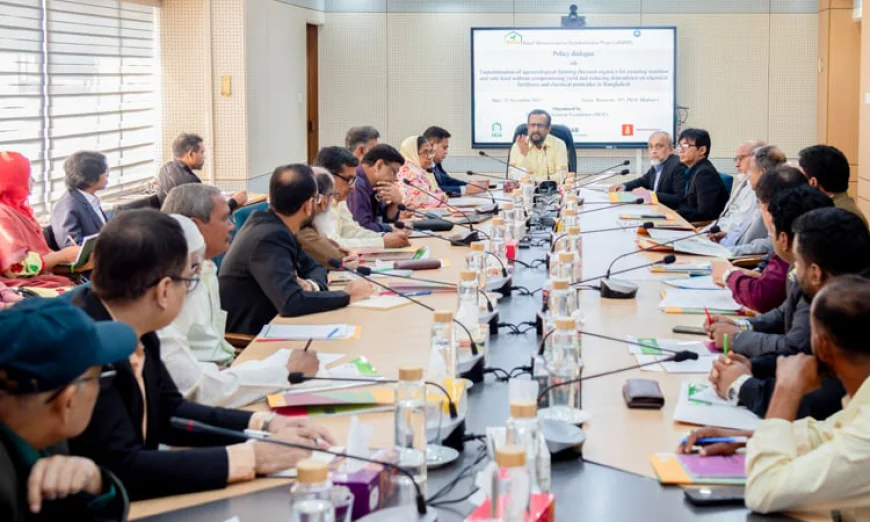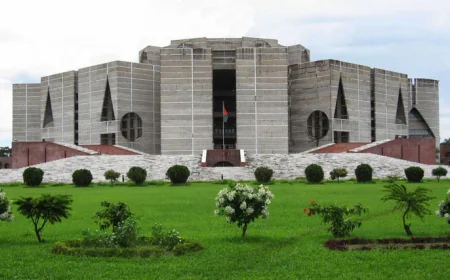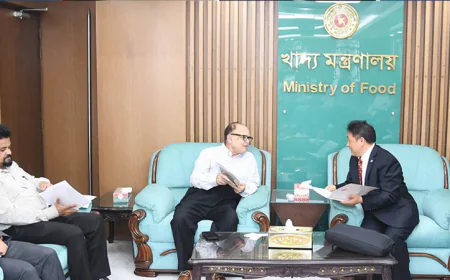Experts Urge Bangladesh to Embrace Agroecology to Curb Chemical Overuse

An important policy dialogue was held today in the city, addressing the unsustainable dependency of Bangladesh’s food production system on chemical fertilizers and pesticides. Organized by the Palli Karma-Sahayak Foundation (PKSF), the event focused on the “Transforming of agroecological farming (beyond organic) for ensuring nutritious and safe food without compromising yield and reduction input subsidies and chemical fertilizers and pesticides in Bangladesh." Bangladesh’s agriculture has long relied excessively on chemical inputs. The indiscriminate use of these chemicals, driven by farmers seeking to boost crop yields, has resulted in significant environmental pollution, reduced soil fertility, loss of biodiversity, and serious threats to human health.
Keynote presenter Dr Shaikh Tanveer Hossain noted that this excessive use over the past 50 years has placed the soil and environment under severe threat. The financial implications of this system are substantial. In the last fiscal year, the government allocated a total subsidy of Taka 24,000 crore to the agriculture sector, with 75 percent of that amount being spent directly on chemical fertilizers. Furthermore, the hidden costs—including environmental, social, and health-related consequences—of the country’s current food production system amount to nearly 13 percent of the national GDP.
Experts at the dialogue unanimously emphasized the urgent need for change. SM Sohrab Uddin, Director General of the Department of Agricultural Extension, declared that there is "no alternative to agroecological farming for ensuring long-term sustainability in agriculture". Md Fazlul Kader, Managing Director of PKSF and chair of the program, highlighted that agroecological farming practices do not necessarily reduce production; in fact, in some cases, they can even enhance yields.
He underscored the need to address farmers’ social behavior to effectively reduce the overuse of chemical fertilizers and pesticides. To successfully scale up this transition, comprehensive strategies were proposed. Dr Shaikh Tanveer Hossain recommended revisiting the National Agriculture Policy, resolving policy inconsistencies, and developing an agroecology-friendly policy framework. He also called for increased investment in organic fertilizer production.
However, PKSF’s Managing Director cautioned that the transition to organic agriculture requires a clear roadmap and cannot occur overnight. Other necessary changes highlighted by speakers include land reform to achieve the substantial changes needed for sustainable expansion of agroecological farming; strengthening the capacities of farmers and other stakeholders to promote indigenous biodiversity and scale up agroecological practices and providing incentives for organic fertilizers and simplifying registration processes for commercial organic fertilizers.
The economic viability of the transition was demonstrated by Mohammed Ali, a farmer from Chuadanga, who shared his success story. By adopting agroecological farming methods, his production increased by nearly 50 percent, while his overall costs decreased by 25 percent. In terms of institutional support, Dr Begum Samia Sultana, Director General of the Soil Resource Development Institute (SRDI), noted that farmers supported by PKSF’s Partner Organizations can now easily access soil testing services at SRDI laboratories across the country and receive specialized fertilizer recommendation cards.
The event saw participation from prominent figures, including faculty members from various agricultural universities, researchers involved in agricultural extension, and representatives from private agriculture sector companies.
















































